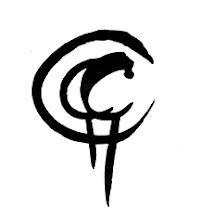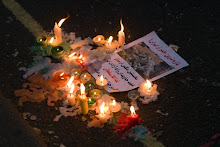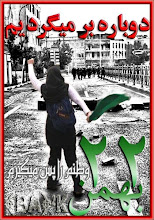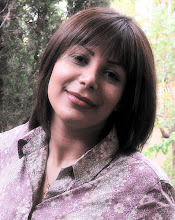Things are hotting up considerably at the corner shop these days. The marching songs still embellish the police sirens in Philip Lane and the price-war continues, happily for the customers. I’ve more or less abandoned Yasir Halim now, in favour of Euro Stores and Mr. Ocean. I interrupted a tumultuous row the other day, arguments being bellowed from one side of the Ocean to the other, ricocheting off the fennel and back to the beer, then up an aisle to the carefully arranged sheep heads and back to the pasta and round again, taking in the grape-seed molasses on the way. Bewildered, I announced that I agreed with HIM and waved towards the tallest, in gold chain, who grinned from ear to ear. Ah-ha, muttered the lad at the counter, checking the change, so you ARE a communist.
They’d been arguing in Kurdish so I hadn’t understood a word. I clearly wasn’t going to be served unless I demanded attention and that seemed the best way to do it. Gold Chain was clearly delighted at my declaration of partisanship. ‘We just need to bring back communism and everything will be ok,’ he announced, beaming beatifically. I wondered when it was that Philip Lane, or Tottenham, or perhaps it was the whole of Haringey, had been a communist enclave. Had I missed something? Counter lad explained that Gold Chain was ‘going back to the mountains to fight.’ He seemed confident that I was now a fully paid up, card carrying member of Gold Chain Communists Inc and that I would repair at once to my cave and make ready to join the march.
I can barely carry a Kalshnikov, let alone fire one, but I will admit to having once had a go. I shot a collection of beer bottles in the mountains outside Dogubayzit, on the Turkish Iranian border. Mr. Siam Shahin, who runs Murat Camping, a tourist camp-site close to Ishakpasha Palace, had taken me there to show me his eleven, glistening smuggling horses. He was a kind of Kurdish God-Father figure, who smuggled alcohol into Iran on horseback, and brought back electrical goods and people- at vast cost presumably. He told me he ran schools for Kurdish children in the mountains. He’d been proudly displaying his gun collection to me and others staying at the camp-site. I admired the Kalashnikov and foolishly remarked that I’d always wanted to fire one. ‘I’ll teach you,’ he offers. You don’t refuse a man with four guns, so I went into the mountains for my first, (and last), fire-arms lesson. It weighed about 25 kilos and jolted back into my shoulder every time I fired it. I did hit a couple of bottles, but not the ones I was intending to hit. Satisfied I’d be a hopeless freedom fighter of the armed variety, I retired to nurse my bruised shoulder.
I just want to make it absolutely clear this was not a ‘training camp’ of any sort. Shehir enjoys very cordial relations indeed with the Iranian Consulate in Erzerum and I had gone there to see if he could extract a visa for me. To say that he was, and presumably still is, an extremely unsavoury character would be an understatement - the more so, somehow, for being so thoroughly personable. It took me about four days fully to realise and then accept exactly how unsavoury he was. The Kalashnikov story sounds like one those cheerful little travellers tales. On the face of it is, but it involves some of most toxic characters I’ve ever met in my life. The people he was bringing over the border, I subsequently found out, were women that he sold to the hotels in the area to provide sex to Russian traders. I hope Gold Chain’s just shooting his mouth off. If not he’ll find himself involved in one the main trades that funds the PKK. I’d rather he just tried to ‘bring back’ his communist enclave in Philip Lane any day.
Thursday, 21 May 2009
Friday, 15 May 2009
We Built This City





E Voila – here we have a group of crafts people, we could call them makers, working together - collaborating - on a project in Kensington, London’s fanciful West End: land of tallish stately houses, painted white, land of locked shared gardens in fashionable squares that aren’t square, land of the Temple of the Applied Arts and The Royal Dinosaur Paddock, Land of the most excellent Polish restaurant, Daquise, descended from Polish inward migration round one, (circa 1945). Here, in a swanky, if ever so slightly frumpy, naff part of the metropolis, was, (trumpet blast):
We Work in a Fragile Material!!
A charming group of Swedes with green fingernails had come to build us a new city. Quite unlike those pesky Danes that preceded them a few centuries ago, they built, wove, constructed, plaited and stuck things on and painted them.
Well, imagine my surprise to find, here in Kensington - KENSINGTON of all places - a Greenham bender!! Sisters – we’ve arrived! We are in Kensington. A Bender in SW1!! No, seriously, it gets better – this bender is ‘supported’ by South Kensington Estates. We’re part of a cool urban regeneration project. Whooood a’ thought it? They even had a spider web !!!!!!
Now, for those youngsters who have absolutely no idea what a Greenham bender is, check this out. Those nice people at the Guardian have made us our very own website – here.
So, ‘We Built this City’ was a faultless exercise in marginal refuge/ee migratory construction, combining basket weaving, papier mache, other kinds of weaving, and the careful tearing up of the Metro, London’s esteemed free newspaper.
It resembled a cow’s stomach, it had four chambers, all of which looked like they were chewing cud. The ‘skeleton’ of the structure was - oh, you know, basket weaving material, and there was chicken wire and papier mache stuck on the chicken wire and painted in parts and, I loved this bit, decorated here and there with pistachio nut shells – the makers having first eaten the said nuts presumably. This was a real Greenham touch.
Inside things got really dinky. There was, as I said, a spider’s web woven out of string, cute little papie mache cups and a tea pot and some ‘clay pots’ made of papier mache and light bulbs on long wires – now we didn’t have them at Greenham – and candles – we had tonnes of them.
‘It’s supercraft’ said one of the team. ‘We also make non-material things but we bring our craft minds to it.’
And ‘supercraft’ it was. It was also funny and delightful and cooperative and un-precious. I wrote this the same weekend I saw it. It was the latest offering of the 6pm project space, curated by Marie Torbensdatter Hermann and hosted by her and co-curator Edmund de Waal. For no particular reason, other than having got distracted by something else, I am posting it now, almost three weeks later and, coincidentally, the Crafts Council’s flagship enterprise, Collect, opened last night at the Saatchi Gallery. This is the Craft Council’s annual fit of decorative craft debauchery, an absurd fetishisation of binge-consumption, belching quietly in time to the theme tune of late consumer capitalism. You can almost see those posters, cant you? Labour isn’t working – brilliantly crafted politics at the time, courtesy of the watchmaker’s son, even it did consume itself into oblivion. Shudder. Ah well, I shall repair to a supercraft tent – now, where did I put those bolt cutters?
Subscribe to:
Posts (Atom)











































